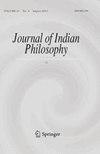Who Identifies with the Aggregates? Philosophical Implications of the Selected Khandha Passages in the Nikāyas
IF 0.4
2区 哲学
0 ASIAN STUDIES
引用次数: 1
Abstract
Abstract In this paper, I discuss some philosophical problems connected with the notion of regarding the aggregates ( khandha ) as self in the Nikāyas. In particular, I focus on the attitude represented by the formula “I am this” ( esohamasmi ) which may be labeled as that of identifying with the aggregates. In the first part of the paper, I point out and analyze certain similes contained in the Nikāyas which may be read as implying the existence of a distinction between the aggregates and the individual who regards them as self. Then, I consider a hypothesis that the aggregates are not objective constituents of a human being but subjectively experienced representational phenomena. I argue that several Nikāya texts imply the existence of important aspects of a human being, in particular cognitive ones, which are not conceptualized in the terms of the five aggregates. I also discuss the possibility of interpreting khandha s as not active in character but as resultant of other cognitive processes. In the last part of the paper I offer a hypothesis that one of the key aspects of regarding the aggregates as self lies in the identification of a human individual with one’s own phenomenal self-representation which results in a mistaken projection of the notions of agency, identity and subjectivity onto something that is inherently devoid of it. I also consider certain parallels between the ideas present in the Nikāyas and the concepts of the modern philosophy of mind.谁认同聚合?< < < < < < < < < < < < < < < < > > > > > < < < > > > Nikāyas
在这篇论文中,我讨论了一些哲学问题,这些问题与Nikāyas中把蕴(khandha)视为自我的概念有关。我特别关注“我是这个”(esohamasmi)这个公式所代表的态度,它可以被标记为认同聚合的态度。在本文的第一部分,我指出并分析了Nikāyas中包含的某些比喻,这些比喻可以被理解为暗示存在着一种区别,即在集合和将它们视为自我的个体之间存在着区别。然后,我考虑一个假设,即集合不是人类的客观组成部分,而是主观体验的表征现象。我认为,一些Nikāya文本暗示了人类重要方面的存在,特别是认知方面,而不是在五蕴的术语中概念化。我也讨论了一种可能性,即把“干”解释为不是主动的,而是其他认知过程的结果。在论文的最后一部分,我提出了一个假设,即将聚合视为自我的一个关键方面在于将人类个体与自己的现象性自我表征相识别,这导致了对代理,身份和主体性概念的错误投射到本质上缺乏它的事物上。我也考虑了Nikāyas中出现的思想与现代心灵哲学概念之间的某些相似之处。
本文章由计算机程序翻译,如有差异,请以英文原文为准。
求助全文
约1分钟内获得全文
求助全文
来源期刊

JOURNAL OF INDIAN PHILOSOPHY
Multiple-
CiteScore
0.80
自引率
0.00%
发文量
32
期刊介绍:
The Journal of Indian Philosophy publishes articles on various aspects of Indian thought, classical and modern. Articles range from close analysis of individual philosophical texts to detailed annotated translations of texts. The journal also publishes more speculative discussions of philosophical issues based on a close reading of primary sources.
 求助内容:
求助内容: 应助结果提醒方式:
应助结果提醒方式:


